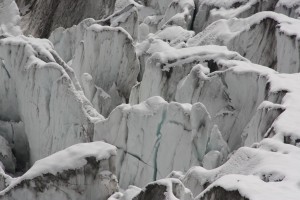Earth Hour, Vancouver and the Arctic
WWF has named the City of Vancouver in Canada as the first ever “Global Earth Hour Capital“. The city was awarded the distinction for its “innovative actions on climate change and dedication to create a sustainable, pleasant urban environment for current and future residents.” It is encouraging to see a Canadian city getting this climate award at a time when Canada is about to take over leadership of the Arctic Council and appears to be pushing hard for the economic development of the Arctic region. At the same time, the country’s glaciers are melting fast.
WWF writes:” Vancouver has been recognised by the jury for its ambition to be global leader on climate-smart urban development in spite of low national ambitions.” Those ambitions refer to the Canadian government’s lack of commitment to binding climate protection targets.
Well done to the City of Vancouver for making its own efforts to promote climate action and to reduce its carbon footprint. The activities include making new buildings carbon-neutral, encouraging people to make more than half their trips on foot, on their bicycles or by public transport. The city also wants to double the number of green jobs.
WWF cooperated with the sustainable cities network ICLEI (Local Governments for Sustainability) , in mobilising cities to join the Earth Hour Challenge. ICLEI provided the use of its carbon Cities Climate Registry (cCCR) –platform to collect the data on cities’ performance.
Canad’s glaciers in danger
Canada has every reason to be concerned about climate change. A recent study indicated that the country’s Arctic Archipelago glaciers will melt faster than ever in the next few centuries and that the loss could be irreversible. The research results – part of the EU-funded ice2sea programme – says 20 percent of the Canadian Arctic glaciers may have disappeared by the end of this century, which would amount to an additional sea level rise of 3.5 cm.
The researchers developed a climate model for the island group in the north of Canada in which they simulated the shrinking and growing of glaciers in this area. The researchers show that the model correctly “predicted” the ice mass loss measured over the last ten years and then used the same model to project the effect of future climate change on Canada’s Arctic Archipelago glaciers. The most important result of the research is it suggests the likely irreversibility of the melting process, according to lead author Dr Jan Lenaerts of Utrecht University. “Even if we assume that global warming is not happening quite so fast, it is still highly likely that the ice is going to melt at an alarming rate. The chances of it growing back are very slim.”
One of the main reasons for this is that snow melting on tundra and sea ice loss from around the glaciers actually reinforce regional warming, with significant consequences on the glaciers of Northern Canada. Snow and sea ice reflect the sunlight, and when the snow and sea ice have disappeared, a large part of the sunlight will be absorbed by the land and the sea, which will significantly increase the local temperature.
Most attention goes to Antarctic and Greenland as the world’s biggest bodies of ice when it comes to melting ice and its effects on the climate and sea level. But the authors of the study stress that Canada’s Arctic Archipelago glaciers represent the third largest ice body in the world. If the Canadian ice caps were to melt completely, the global average sea level could rise by 20 centimetres. Co-author Professor Michiel van den Broeke of Utrecht University says he and his colleagues wanted to demonstrate that the Canadian ice caps should be included in the calculations.”
Professor David Vaughan programme leader of ice2sea, who is based at the British Antarctic Survey in Cambridge, says, “The Canadian archipelago is an area where climate is changing rapidly, and the glaciers here contain enough ice that we should not ignore their contribution to sea-level rise. Added to glaciers in Alaska, the Russian Arctic and Patagonia, these apparently small contributions add up to significant sea-level rise. A key success of this study was in showing that the model performed well in reproducing recently observed changes. That success gives us confidence in how the model predicts future changes”.
So, coming back to Vancouver. Congratulations on becoming Earth Hour Capital and demonstrating commitment to halting climate change – and a reminder for the rest of us:
Earth Hour, when people and cities are encouraged to switch off lights and electricity for an hour in the interests of the climate and the environment, is coming up this Saturday March 23rd.
















